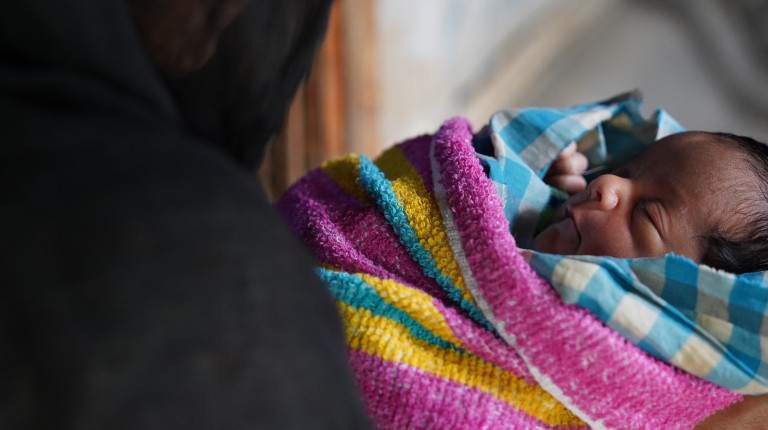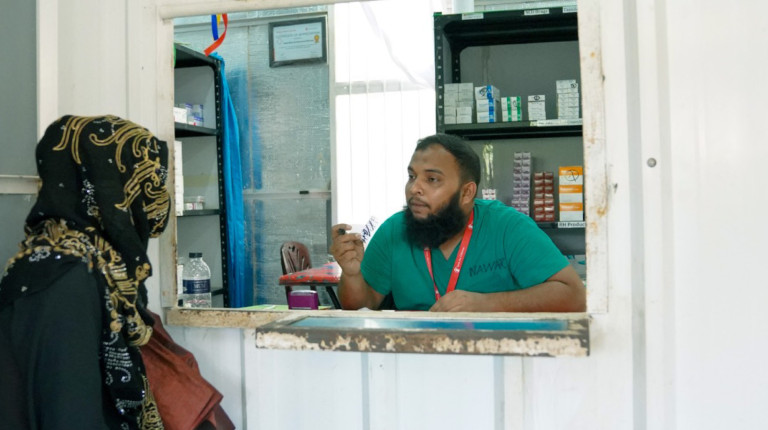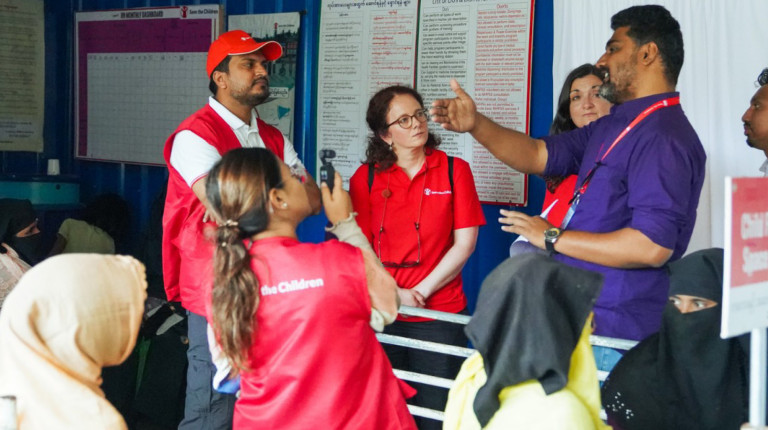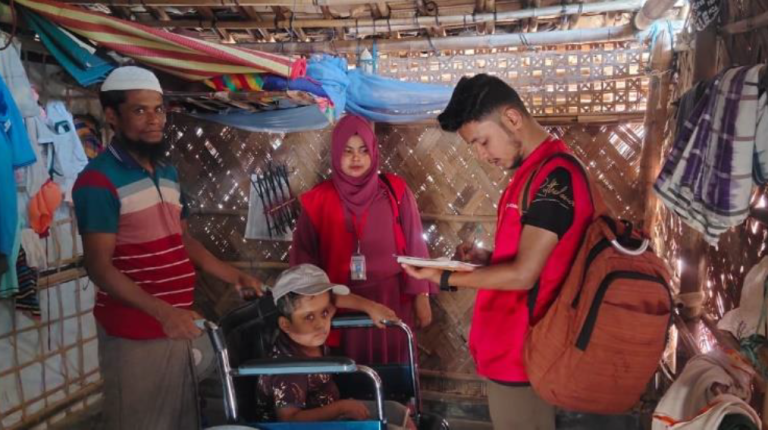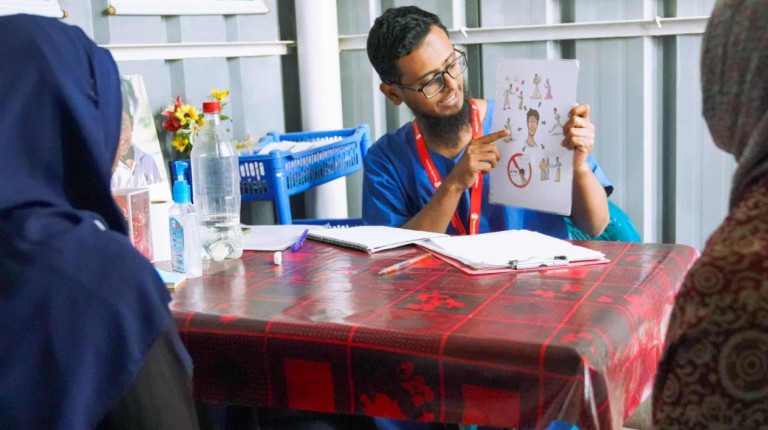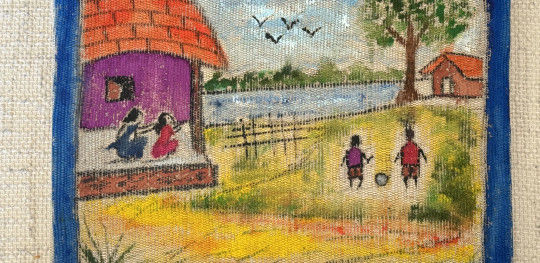Providing urgent healthcare for refugees in Cox’s Bazar
Cox’s Bazar is home to the largest refugee settlement in the world, with almost one million Rohingya refugees living inside the sprawling camps. Many families are reliant on food rations to survive. They need access to safe water and healthcare. Three in four children are out of school, girls are exposed to violence and abuse and 30,000 babies are born each year, only to grow up in the most difficult circumstances. As one of the leading international NGOs working inside the camps, Save the Children is working to ensure healthcare has no boundaries by providing much-needed medical services inside the camps.
Why Rohingya children in Cox’s Bazar need urgent healthcare
The basic living conditions inside the camps are dire. Overcrowded makeshift housing, combined with no access to adequate hygiene and sanitation facilities or clean water, mean that children frequently contract respiratory tract infections, especially the common cold. Pneumonia is the most common cause of death, and acute diarrhoea, skin diseases, worm infections and scabies are common. Unsafe home delivery practices and delays in the uptake of postnatal care also place newborns and mothers at risk of avoidable complications.
Another key area of concern is around the under-reporting of high-risk and special-needs groups, including survivors of gender-based violence. The sexual and reproductive health of adolescents and women is an ongoing area of concern, with a need to strengthen access to safe, voluntary family planning, maternal and newborn health services, as well as basic emergency maternal, obstetric and neonatal care.
Save the Children’s health response inside the camps
Save the Children is providing integrated, inclusive, and quality primary health care services to refugees and the local host community through its health posts in Camp 4 and Camp 20.
Services include outpatient consultations, management of communicable and non-communicable diseases, emergency referrals, services for child health (particularly malnutrition), antenatal and postnatal care, family planning, maternal nutrition counselling, complementary feeding counselling, sexual and reproductive health services, mental health and psychosocial support, and gender-based violence services.
Fourteen Community Health Workers conduct community-based outreach activities across the two camps to enhance health seeking behaviour, health awareness and resilience of the Rohingya refugee and host community. We have also helped establish community support groups, including peer support groups for adolescents, mother-to-mother support groups, groups for community and religious leaders, and disability inclusion support groups, which play a crucial role in enhancing community participation in health activities. Our work also includes rehabilitation services for people with disabilities, including physiotherapy and necessary assistive devices for persons with disabilities, and we have better equipped our health posts with ramps, accessible toilets, triage areas, signage, lighting, and a skilled workforce to ensure quality services.
How we know we’re making a difference
Some of our recent highlights include:
- Health posts provided support to 14,392 refugees (plus 145 people from the host community)
- 94% were satisfied with their care
- 4,297 pregnant or breastfeeding mums were taught about good feeding practices for infants and young children
- 1,722 people received mental health and psychosocial support sessions; 45 people with disabilities received assistive devices
- Fourteen Community Health Workers (CHWs) conducted continuous community-based outreach activities across the two camps to enhance health seeking behaviour, health awareness and resilience of the Rohingya refugee and host community.
But behind these numbers are stories from children like Riaz*, a resilient 10-year-old boy born with hydrocephalus, a condition that left him unable to walk since the age of two. Forced to flee Myanmar in search of a better life, Riaz's family found themselves grappling with the harsh realities of life in the refugee camp.
Living in cramped quarters, Riaz's parents bore the weight of his condition, carrying him for every daily task. But since Riaz has been supported with rehabilitation, his family have discovered a newfound sense of community within the Disability Inclusion Support Committee. Here, they’ve found solace among peers, sharing experiences and supporting one another on the path to empowerment.
Riaz received personalised care from dedicated professionals who assessed his needs and provided regular rehabilitation services. But perhaps the most transformative moment came with the gift of a wheelchair. With newfound mobility, Riaz's world has expanded. No longer confined to his home, he is able to explore the camp, and open doors to learning, friendship, and new possibilities.
For Riaz's parents, the impact has been profound. Freed from the physical strain of carrying their son, they have witnessed his blossoming health.
Riaz's mother Jamila* told us:
“Since getting a wheelchair, Riaz can move from one place to another by himself. We have learned a lot and could improve our son's health, mobility, and education. We have also improved our own awareness and skills."
*Names changed to protect identities.
Who makes our programme possible
Our response in Cox’s Bazar is made possible through the generous support of the New Zealand Disaster Response Partnership, alongside our donors, partners, and dedicated team members.
Save the Children works in partnership with the Bangladesh Government.


